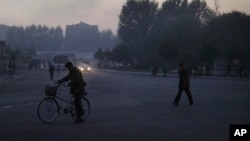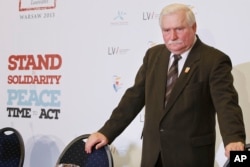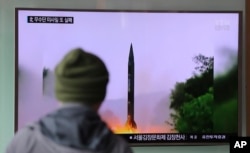Lech Walesa, the Polish leader of the anti-communist Solidarity movement in the 1980s, is pessimistic about the prospects of internal opposition groups rising up in North Korea.
“It is questionable at this point whether North Koreans will fight for freedom because they are too poor,” he said during an exclusive interview with VOA in Seoul.
The labor activist co-founded the first independent trade union in the Soviet Union that eventually helped topple Communism in Eastern Europe, won the Nobel Peace Prize in 1983 for his pro-democracy efforts and served as President of Poland from 1990 to 1995, after the fall of the Soviet Union.
Walesa was in Seoul recently to attend an international forum and reflected on his own experience leading a peaceful opposition movement within a communist regime, and how the international community can help foster peaceful change in North Korea.
For the Polish Solidarity movement, the key to victory was the power of their own conviction, believing that if they stayed united they could force the system to change.
“What we emphasized was that they could kill us or imprison us, but we had a belief that we would never give up. We wanted to emphasize that we would not work for communism while they at some point would give in,” he said.
Repressive North
However, he admitted the conditions that currently exist in North Korea are more brutal and repressive then those that were in place in Poland and the Soviet Union when his trade union began organizing, and that the government in Pyongyang continues to suppress any potential organized internal opposition.
In 2014, a U.N. Commission of Inquiry (COI) on human rights in North Korea issued a report documenting a network of political prisons in the country holding 120,000 people and a list of atrocities that include “forced labor, torture, imprisonment, rape, forced abortions and other sexual violence.”
The independent group Human Rights Watch says in addition to sending dissidents who criticize North Korean leader Kim Jong Un to prison without trial, the government also practices collective punishment, sending entire families, including children, to prison camps for “anti-state offenses.”
Walesa said the way the Kim government mistreats its people while also developing a nuclear weapons program is ultimately unsustainable.
“I would like to express that the behavior North Korea is exhibiting now is suicide. If they continue to behave in such way, they will lose, and with an extension of time it will bring negative effects to North Korea,” he said.
Nuclear threat
U.N. Security Council resolutions have banned North Korea from developing nuclear weapons and ballistic missile technology, and have imposed rounds of increasingly stronger sanctions on Pyongyang since it conducted its first nuclear test in 2006.
The most recent set of sanctions imposed in March has not deterred North Korea. Since then Pyongyang has accelerated its developing program by conducting 25 missiles launches and a second nuclear test this year in September.
China has reportedly put on hold, until after the U.S. presidential election, Security Council negotiations to impose new sanctions on North Korea for its most recent violations.
Rather than focusing only on pressuring Pyongyang, Walesa suggested South Korea and the international community also open up dialogue on the peaceful reunification of the Korean peninsula by offering increased inter-Korean cooperation, engagement to improve economic conditions and reassuring the elites in Pyongyang that they too would benefit by transitioning to freedom and democracy.
“What I would like to say at first is that 'the world needs you'. You can live more rich. You can live better, by enjoying freedom. But both need to cooperate well and understand each other. The world is open for North Korea. North Korea does not need to escape. Freedom opens many doors,” he said.
His views echo recommendations last month by members of a U.S.-based task force, who called for Washington and its allies to change their approach to dealing with the North Korean nuclear threat, saying it is time to rethink the problem.
The task force, which was organized by the Council on Foreign Relations, recommended offering North Korea real incentives for agreeing to a moratorium on nuclear and missile tests, returning to international talks and reaffirming the goal of denuclearization.
The Polish Nobel Peace laureate’s emphasis on engagement is reminiscent of the Sunshine policy of the late South Korean President Kim Dae-jung who also won the Nobel Peace Prize in 2000. He initiated increased inter-Korean assistance and cooperative projects on the premise that they would lead to peaceful co-existence and to some form of unification.
Over the years, however, the South withdrew economic aid as the North initiated provocations and continued its defiant pursuit of nuclear weapons.
Both Washington and Seoul have offered new talks to work out a deal to provide development assistance and security guarantees if Pyongyang takes concrete steps to halt its nuclear program. They contend it is the Kim government that refuses to engage in serious talks, and that increased sanctions are needed to keep the pressure on the leadership to come back to the negotiating table.
Kim Hwan-yong and Youmi Kim in Seoul contributed to this report.







